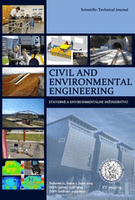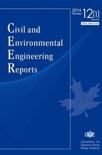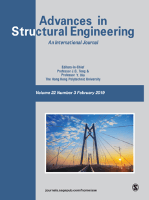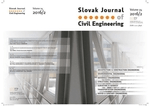
Advances in Civil Engineering
Scope & Guideline
Innovating Infrastructure, Inspiring Change
Introduction
Aims and Scopes
- Structural Engineering and Analysis:
Research focusing on the behavior, design, and performance of structural systems, including innovative materials and methods for enhancing structural resilience against various loads such as seismic, wind, and dynamic effects. - Geotechnical Engineering and Soil Mechanics:
Studies investigating the physical and mechanical properties of soil and rock, including the design of foundations, slope stability, and the interaction between earth structures and construction practices. - Construction Materials and Sustainability:
Exploration of sustainable construction materials, including recycled and eco-friendly alternatives, and the development of innovative concrete and asphalt mixtures that enhance durability and performance. - Environmental Engineering and Water Resources:
Research addressing the impacts of civil engineering practices on the environment, including water quality management, stormwater management, and the effects of climate change on infrastructure. - Construction Management and Technology:
Studies on project management methodologies, including the application of Building Information Modeling (BIM), risk management, and the integration of advanced technologies such as AI and machine learning in construction processes. - Transportation Engineering:
Research related to the planning, design, operation, and management of transportation systems, including traffic flow analysis, infrastructure resilience, and the impact of urbanization on transport networks.
Trending and Emerging
- Smart Infrastructure and Digital Twins:
Research on the integration of digital twin technology in infrastructure management is trending, focusing on real-time monitoring, predictive maintenance, and the use of big data to enhance decision-making processes. - Sustainable and Green Building Practices:
There is an increasing emphasis on sustainable construction practices, including the use of renewable materials and technologies that reduce the environmental impact of construction and promote energy efficiency. - Machine Learning and AI Applications:
The application of machine learning and AI in predictive modeling, structural health monitoring, and optimization of construction processes is gaining significant traction, indicating a shift towards data-driven approaches. - Resilience and Adaptation to Climate Change:
Research focused on enhancing the resilience of infrastructure to climate change impacts, such as extreme weather events and rising sea levels, is emerging as a critical area of study. - Geotechnical Innovations:
Innovations in geotechnical engineering, particularly in the use of advanced materials and techniques for soil stabilization and foundation engineering, are becoming increasingly important in contemporary research.
Declining or Waning
- Traditional Materials Research:
There has been a noticeable decline in studies focusing solely on traditional materials such as plain concrete and steel, as the field shifts towards more sustainable and innovative materials. - Basic Theoretical Studies in Civil Engineering:
Research that does not apply to practical engineering solutions or lacks direct applicability has seen reduced interest, with more emphasis placed on applied research that addresses real-world challenges. - Conventional Construction Methods:
The focus on conventional construction techniques is waning, as there is a growing interest in advanced construction methods such as prefabrication, modular construction, and the use of automation and robotics. - Low-Impact Development Techniques:
Interest in low-impact development techniques appears to be decreasing as more comprehensive and integrated approaches to environmental management and sustainability gain traction.
Similar Journals

Periodica Polytechnica-Civil Engineering
Bridging Theory and Practice in Engineering ExcellencePeriodica Polytechnica-Civil Engineering is a prestigious journal published by the Budapest University of Technology and Economics, dedicated to advancing the field of civil engineering through high-quality research and innovative practices. Established in 1972, the journal has transitioned through various phases of publication and now spans an expansive range of topics within civil and structural engineering, geotechnical engineering, and engineering geology. With an impact factor indicating its growing influence and a commendable placement in the Q3 quartile according to the latest 2023 metrics, it recognizes contributions that bridge theoretical advancements with practical applications. While currently not open access, the journal remains a vital resource for researchers, professionals, and students seeking to stay abreast of the latest developments in engineering design, construction techniques, and geotechnical innovations. The continuous publication of significant research after almost five decades underscores its commitment to disseminating knowledge crucial for the world’s infrastructure challenges, making it an essential reference point within the engineering community.

Civil and Environmental Engineering
Transforming challenges into engineering breakthroughs.Civil and Environmental Engineering, published by SCIENDO, is a prominent open-access journal dedicated to advancing research and knowledge in the fields of civil and structural engineering, as well as environmental engineering. Since its inception in Germany, it has been committed to promoting cutting-edge studies and methodologies that address the pressing challenges in these domains. With an ISSN of 1336-5835 and E-ISSN of 2199-6512, the journal is accessible to a global audience, having adopted an open-access policy since 2014 to enhance the visibility and dissemination of scholarly work. The journal currently holds a Q3 ranking in both Civil and Structural Engineering and Environmental Engineering, as of 2023, reflecting its growing influence within the academic community. It operates within a framework of rigorous peer-review standards and encourages contributions that not only contribute to theoretical advancements but also have practical implications for real-world applications. Researchers, professionals, and students alike will find invaluable insights and innovative perspectives in the latest studies published from 2018 to 2024.

Civil and Environmental Engineering Reports
Unlocking insights for a greener tomorrow in engineering.Civil and Environmental Engineering Reports is a prestigious open access journal published by UNIV ZIELONA GORA, dedicated to advancing research in the dynamic fields of civil and environmental engineering. With its ISSN 2080-5187 and E-ISSN 2450-8594, the journal aims to disseminate innovative studies, methodologies, and practical applications that address contemporary challenges in these disciplines. Since its establishment in 2014 as an open access platform, it has emerged as a vital resource for researchers, professionals, and students alike, enabling free access to high-quality research findings. Situated at Licealna 9, Zielona Góra 65-417, Poland, the journal strives to foster collaboration and knowledge exchange within the global engineering community, making it an essential reading for anyone invested in civil and environmental engineering advancements.

Bauingenieur
Transforming Ideas into Engineering SolutionsBauingenieur, an established journal in the field of Building and Construction and Civil and Structural Engineering, has been a significant platform for scholarly discourse since its inception in 1969. Published by VDI FACHMEDIEN GMBH & CO KG UNTERNEHMEN FACHINFORMATIONEN in Germany, this journal, available in both print (ISSN: 0005-6650) and electronic formats (E-ISSN: 1436-4867), serves as a vital resource for researchers, professionals, and students dedicated to advancing knowledge and practice in engineering. Although currently without open access options, Bauingenieur aspires to contribute to the academic community by presenting cutting-edge research, case studies, and technical reviews within the realms of construction and civil engineering. As evidenced by its categorizations in the 2023 Scopus rankings, where it has a Q4 designation in both relevant categories, it provides an essential resource for understanding current trends and challenges in the industry. The journal welcomes contributions that push the boundaries of knowledge and foster innovative solutions in the built environment.

Infrastructures
Transforming Ideas into Infrastructure InnovationsInfrastructures is a distinguished open-access journal, published by MDPI since 2016, dedicated to advancing the fields of engineering and construction through interdisciplinary research and critical insights. Based in Switzerland, it serves a global community of scholars and professionals, providing a platform for innovative studies that drive progress in Building and Construction, Civil and Structural Engineering, Computer Science Applications, Geotechnical Engineering and Engineering Geology, and various aspects of Materials Science. With an impressive impact factor and a positioning in the Q2 category across multiple engineering fields, the journal's robust ranking reflects its commitment to high-quality research, with notable Scopus rankings showcasing its significant contribution to academic discourse. Infrastructures not only facilitates open access to essential knowledge but also aims to bridge the gap between theory and practical application, making it an invaluable resource for researchers, industry professionals, and students alike.

Gradevinar
Connecting Ideas, Building Futures in Civil EngineeringGradevinar, published by the Croatian Society of Civil Engineers-HSGI, is a leading Open Access journal in the field of Civil and Structural Engineering, with a significant history that dates back to its inception in 1980. This journal, with the ISSN 0350-2465 and E-ISSN 1333-9095, has established itself as a vital platform for disseminating innovative research and practical developments in civil engineering, particularly since it became Open Access in 2000, facilitating unrestricted access to its wealth of knowledge. As of 2023, Gradevinar is ranked in the third quartile (Q3) of Scopus’s Civil and Structural Engineering category, demonstrating its growing influence and relevance in the academic community, with a current ranking of #255 out of 379 journals in the field. Researchers, professionals, and students benefit from this journal's commitment to high-quality content that reflects the latest advancements and best practices in civil engineering, contributing to both technical proficiency and sustainable development in infrastructure projects across Croatia and beyond.

ADVANCES IN STRUCTURAL ENGINEERING
Fostering Collaboration for Sustainable Construction SolutionsADVANCES IN STRUCTURAL ENGINEERING, published by SAGE PUBLICATIONS INC, is a leading journal dedicated to the advancement of knowledge in the fields of Building and Construction, as well as Civil and Structural Engineering. With a solid impact factor and a commendable Scopus ranking (Rank #60 in Building and Construction, Rank #105 in Civil and Structural Engineering), this journal stands at the forefront of academic research, providing a platform for high-quality articles that contribute significantly to the discipline. Covering a range of topics from innovative construction techniques to sustainable engineering practices, the journal aims to foster collaborative dialogue among researchers, industry professionals, and students alike. As of 2023, it boasts impressive category quartiles, ranking Q1 in Building and Construction and Q2 in Civil and Structural Engineering. ADVANCES IN STRUCTURAL ENGINEERING is a vital resource for those looking to stay abreast of emerging trends and groundbreaking developments in structural engineering, promoting an environment of continuous learning and application of best practices. With a convergence of research from 1999 to 2024, the journal not only emphasizes theoretical frameworks but also bridges the gap between academia and practical application in engineering projects.

Slovak Journal of Civil Engineering
Advancing civil engineering through open access innovation.Welcome to the Slovak Journal of Civil Engineering, a premier open-access publication dedicated to advancing the field of civil engineering. Published by SCIENDO, this journal has been providing a platform for the dissemination of groundbreaking research since 2010, ensuring that all articles are freely accessible to a global audience. With a commitment to promoting innovation and excellence within civil engineering, the journal covers a wide range of topics, including structural engineering, transportation systems, geotechnics, and environmental engineering. The Slovak Journal of Civil Engineering is designed to engage a diverse community of researchers, professionals, and students, fostering collaboration and knowledge-sharing to address contemporary challenges in the field. With its open-access model, the journal not only enhances visibility for authors but also ensures that the latest findings and methodologies reach practitioners and academics alike, making it an essential resource for anyone interested in civil engineering advancements. Stay connected with the evolving landscape of civil engineering through this influential publication.

Civil Engineering Journal-Stavebni Obzor
Shaping the Future of Civil Engineering TogetherWelcome to the Civil Engineering Journal-Stavebni Obzor, an esteemed academic publication dedicated to advancing the field of civil engineering. Published by the Czech Technical University in Prague, Faculty of Civil Engineering, this journal has provided a platform for innovative research and critical discourse since its inception. With an ISSN of 1210-4027 and an E-ISSN of 1805-2576, this Open Access journal has been facilitating wide dissemination of knowledge in civil engineering since 2014, ensuring that valuable research reaches a global audience without barriers. The journal is committed to fostering collaboration among researchers, professionals, and students, encouraging the exchange of ideas that drive the discipline forward. Its diverse scope encompasses various aspects of civil engineering, making it an essential resource for anyone looking to stay at the forefront of this dynamic field. Located in Prague, a hub of engineering excellence, this journal not only reflects the latest trends and innovations but also contributes to shaping the future of civil engineering.

Electronic Journal of the Faculty of Civil Engineering Osijek-e-GFOS
Fostering Collaboration Through Open Access ResearchWelcome to the Electronic Journal of the Faculty of Civil Engineering Osijek-e-GFOS, a prominent platform dedicated to the dissemination of innovative research in the field of civil engineering. Published by the University of Osijek, this Open Access journal has been accessible to the global academic community since 2010, facilitating the sharing of knowledge and advancements without financial barriers. With an E-ISSN of 1847-8948, the journal aims to cover a broad scope of civil engineering disciplines, including structural engineering, geotechnics, environmental engineering, and construction management, among others. It serves as a crucial resource for researchers, professionals, and students, providing them with insightful articles and studies that contribute to the development of best practices in the field. By promoting open collaboration and knowledge sharing, the Electronic Journal of the Faculty of Civil Engineering Osijek-e-GFOS stands as a testament to the commitment of the University of Osijek to enhance the field of civil engineering through impactful research and educational outreach.